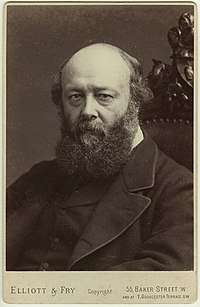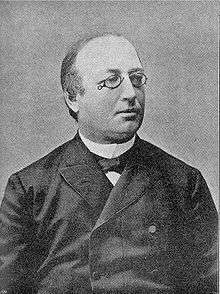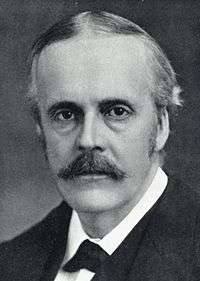July 1902
| << | July 1902 | >> | ||||
|---|---|---|---|---|---|---|
| Su | Mo | Tu | We | Th | Fr | Sa |
| 1 | 2 | 3 | 4 | 5 | ||
| 6 | 7 | 8 | 9 | 10 | 11 | 12 |
| 13 | 14 | 15 | 16 | 17 | 18 | 19 |
| 20 | 21 | 22 | 23 | 24 | 25 | 26 |
| 27 | 28 | 29 | 30 | 31 | ||

July 11, 1902: Robert Gascoyne-Cecil, Lord Salisbury, retires...

July 5, 1902: Erik Boström returns as Prime Minister of Sweden

... and is succeeded as Prime Minister of the United Kingdom by his nephew, Arthur Balfour
July 1, 1902 (Tuesday)
- The Raymond Stampede, Canada's oldest professional rodeo, is launched in Raymond, Alberta.[1]
- The Philippine Organic Act is enacted by the United States Congress and becomes law, providing for the election of a Philippine Assembly following the cessation of the insurrection.[2]
- Oliver Robert Hawke Bury becomes general manager of Britain's Great Northern Railway, after working for the Buenos Aires and Rosario Railway in Argentina.[3]
- Luceafărul ("Evening Star"), a literary magazine in the Romanian language, is published for the first time, in Budapest.[4]
- Born: William Wyler, US film director, in Mülhausen, Alsace-Lorraine (now Mulhouse, France), under the name Wilhelm Weiller (died 1981)
- Died: Anthony Giuseppe, an immigrant involved in the coal miners' strike, apparently accidentally shot by Coal and Iron Police at a Lehigh Valley Coal Company colliery in Old Forge, Lackawanna County, Pennsylvania, USA.[5]
July 2, 1902 (Wednesday)
- The Wimbledon tennis tournament concludes, with British players Laurence Doherty and Muriel Robb taking the Men's and Women's Singles titles.[6]
July 3, 1902 (Thursday)
- Ministerial Party candidate Henry Garde wins the by-election for Maryborough in Queensland, Australia, following the death of Charles Hastings Barton a few weeks earlier. On the same day, Digby Denham retains Oxley for the Ministerial party in the by-election caused by the death of Samuel Grimes.[7]
July 4, 1902 (Friday)
- The Pacific Electric Railway opens an interurban line between Los Angeles and Long Beach, California.[8]
- Born:
- Meyer Lansky, US mobster known as the "Mob's Accountant", in Grodno, Russian Empire, as Meier Suchowlański[9] (died 1983)
- George Murphy, US dancer, actor, and politician, in New Haven, Connecticut (died 1992)
- Died: Swami Vivekananda, 39, Indian religious leader, during meditation practice. He had previously predicted that he would not reach the age of forty.[10]
July 5, 1902 (Saturday)
- Following the resignation of Fredrik von Otter, Erik Gustaf Boström becomes Prime Minister of Sweden for a second time, having previously served from 1891 to 1900.
- 500,000 dinners are served to Londoners to celebrate the coronation of King Edward VII and Queen Alexandra, even though the ceremony has been postponed until August because of the King's illness, in an exercise supervised by Sir Thomas Lipton.[11]
- The only cricket Test match ever played at Bramall Lane, Sheffield, England, is won by the touring Australian XI.
July 6, 1902 (Sunday)
- Died: Maria Goretti, 11, Italian Catholic saint, murdered by Alessandro Serenelli
July 7, 1902 (Monday)
July 8, 1902 (Tuesday)
- Service of Reclamation within U.S. Geological Survey.
July 9, 1902 (Wednesday)
July 10, 1902 (Thursday)
- The Rolling Mill Mine disaster in Johnstown, Pennsylvania, USA, results in the deaths of 112 miners, mostly killed by methane gas poisoning following an explosion.[12]
- Born: Kurt Alder, German-Polish chemist, Nobel Prize laureate, in Königshütte (died 1958)
July 11, 1902 (Friday)
- The Marquess of Salisbury retires as British prime minister, for health reasons, to be replaced by his nephew Arthur Balfour.
- The Order of the Garter is conferred by King Edward VII of the United Kingdom on Archduke Franz Ferdinand of Austria.
- Born: Rolf Widerøe, Norwegian accelerator physicist, in Oslo (died 1996)
July 12, 1902 (Saturday)
- The first of the Neuquén-Cipolletti bridges on Argentina's Buenos Aires Great Southern Railway is opened. The first locomotive to pass over it, number 205, is driven by Antonio Mazzarolo.[13]
July 13, 1902 (Sunday)
July 14, 1902 (Monday)
- St Mark's Campanile, the bell tower of St Mark's Basilica in Venice, completely collapses, demolishing the logetta and killing the caretaker's cat.[14]
July 15, 1902 (Tuesday)
July 16, 1902 (Wednesday)
- Born: Alexander Luria, Russian neuropsychologist, in Kazan (died 1977)
July 17, 1902 (Thursday)
- Willis Carrier installs an early air conditioning system at the Sackett-Wilhelms Lithographing & Publishing Company premises in Buffalo, New York.
- The Texas Mexican Railway is converted to a standard gauge.
- The current regulation U.S. Army saber “saber for all officers, Model 1902" was adopted on July 17, 1902 by authority of General Order No. 81.
July 18, 1902 (Friday)
- A public sea-water bath is opened at Kalvebod Brygge Copenhagen, Denmark.[15]
July 19, 1902 (Saturday)
July 20, 1902 (Sunday)
July 21, 1902 (Monday)
- Fluminense Football Club is founded in Rio de Janeiro, Brazil.
- Born: Joseph Kesselring, US playwright, in New York City (died 1967)
July 22, 1902 (Tuesday)
- The British Museum Act 1902 is given the Royal Assent, empowering the trustees to remove "newspapers and other printed matter which are rarely required for public use" to a remote storage location. These would form the basis of the British Library Newspapers Division at Colindale.[16]
- Died: Thomas Croke, 78, Irish Catholic bishop of Auckland, New Zealand, and Archbishop of Cashel
July 23, 1902 (Wednesday)
- Bournemouth Corporation Tramways begins operating in Bournemouth, Hampshire, UK.[17]
July 24, 1902 (Thursday)
July 25, 1902 (Friday)
- Boxer Bob Fitzsimmons fails in his bid to recover the World Heavyweight Championship, when defeated by James J. Jeffries with an eighth-round knockout in San Francisco, USA.
July 26, 1902 (Saturday)
July 27, 1902 (Sunday)
- Died: Gustave Trouvé, 63, French electrical engineer and inventor (sepsis)
July 28, 1902 (Monday)
- Born:
- Karl Popper, Austrian philosopher, in Vienna (died 1994)
- Albert Namatjira, Australian painter, in Hermannsburg, Northern Territory (died 1959)
July 29, 1902 (Tuesday)
- In the Leeds North by-election in the UK, brought about by the sitting MP, William Jackson, having been created Baron Allerton, Liberal candidate Rowland Barran takes the seat from the Conservatives with a majority of 758.[18]
July 30, 1902 (Wednesday)
- The militia is used to restore order in Shenandoah, Pennsylvania, after a street fight between striking coal miners and police, which resulted in at least one death.[19]
- The 6th annual Bible Institute begins at Earlham College, a Quaker institution in the United States.
July 31, 1902 (Thursday)
- The inaugural Circuit des Ardennes motor race takes place near Bastogne, and is won by British driver Charles Jarrott.
- The lower section of the Great Orme Tramway, the longest funicular railway in the British Isles, is opened at Llandudno, Wales.[20]
References
- Turner, ed., Lawrence (1993). Raymond Remembered : Settlers, Sugars and Stampedes : A History of the Town and People of Raymond. Town of Raymond. pp. 12–154 to 12–157. ISBN 0-9697655-0-9.CS1 maint: extra text: authors list (link)
- "The History of the First Philippine Assembly (1907–1916)". Official Website. National Historical Commission of the Philippines. Retrieved 18 December 2011.
- "Biographies of chairmen, managers & other senior officers". Steam Index. September 30, 2008. Archived from the original on 25 December 2008. Retrieved November 20, 2008.
- Marcel Cornis-Pope; John Neubauer (18 July 2007). History of the Literary Cultures of East-Central Europe: Junctures and disjunctures in the 19th and 20th centuries. Volume III: The making and remaking of literary institutions. John Benjamins Publishing Company. p. 59. ISBN 978-90-272-9235-3. Retrieved 14 August 2015.
- "Striker Shot Dead by Police". Daily News from Mount Carmel, Pennsylvania. July 2, 1902. Retrieved 25 March 2016.
- Tingay, Lance (1977). 100 Years of Wimbledon. Enfield [Eng.]: Guinness Superlatives. ISBN 0900424710.
- "Queensland General Election Dates 1860–1929" (PDF). Queensland Parliament. Retrieved 16 December 2013.
- Walker, Jim (2006). Images of Rail: Pacific Electric Red Cars. Arcadia Publishing. p. 7. ISBN 0-7385-4688-7.
- Mafia encyclopedia, Carl Sifakis, 2005, pp. 250–253
- Virajananda, Swami, ed. (2006) [1910], The Life of the swami Vivekananda by his eastern and western disciples... in two volumes (Sixth ed.), Kolkata: Advaita Ashrama, pp. 645–662, ISBN 81-7505-044-6
- "The Postponed Coronation and Appendix Operation of King Edward VII – 24 June 1902". blog.britishnewspaperarchive.co.uk. The British Newspaper Archive. 23 June 2013. Archived from the original on 24 December 2013. Retrieved 21 December 2013.
- The Rolling Mill Mine Disaster, by Steven Pavlik
- Edelman, Ángel (1991). Primera historia del Neuquén: recuerdos territorianos [Early history of Neuquén: Territorial memories]. Plus Ultra. ISBN 978-9-502-11017-2.
- Produced, written and directed by David DeVries (2003-11-04). "Inviting Disaster 4". Modern Marvels. The History Channel.
- "1902". Selskabet for Københavns Historie. Retrieved 2010-01-20.
- The Public General Acts Passed in the Second Year of the Reign of His Majesty King Edward the Seventh. London: printed for His Majesty's Stationery Office. 1902.
- Turner, Keith (1996). The Directory of British Tramways. Patrick Stephens Ltd. ISBN 1-85260-549-9.
- The Constitutional Year Book, 1904, published by Conservative Central Office, page 169 (193 in web page)
- "The Iron Age" (vol. 70, page 45). Chilton Company. August 7, 1902.
- Turner, Keith (2003). The Great Orme Tramway – over a century of service. Llanrwst: Gwasg Carreg Gwalch. pp. 65–68. ISBN 978-0-86381-817-2.
This article is issued from Wikipedia. The text is licensed under Creative Commons - Attribution - Sharealike. Additional terms may apply for the media files.